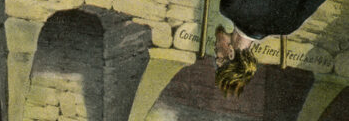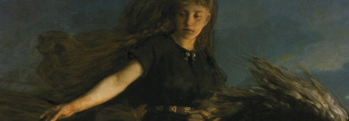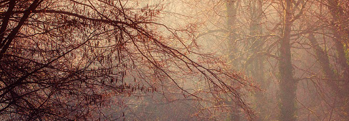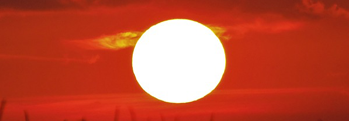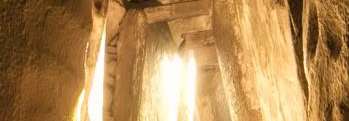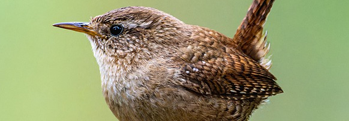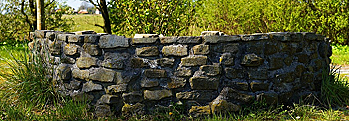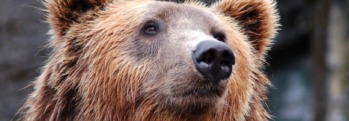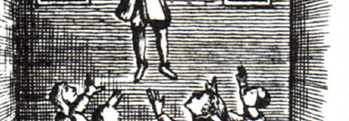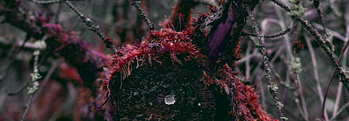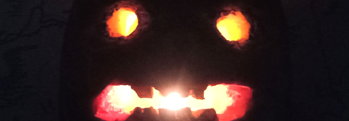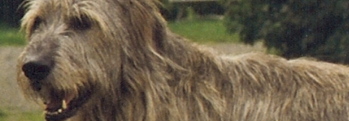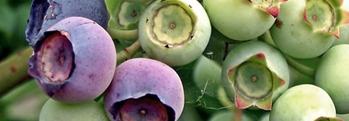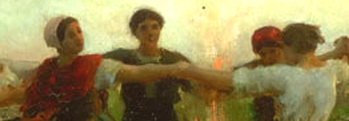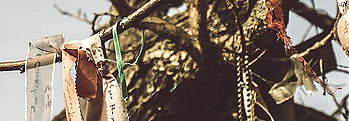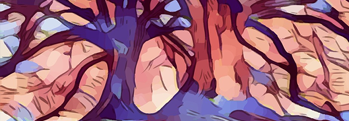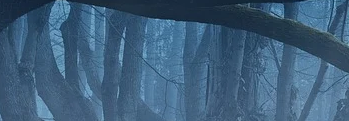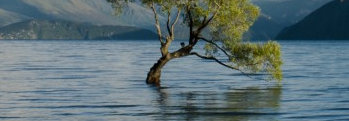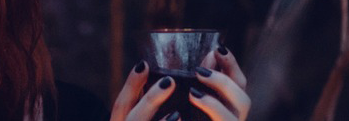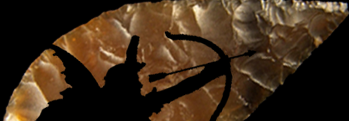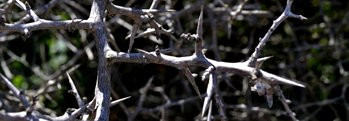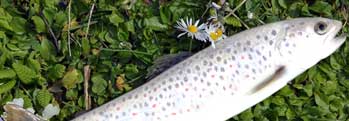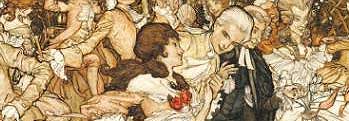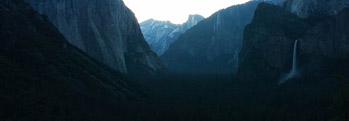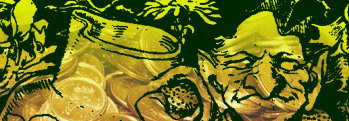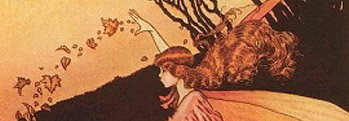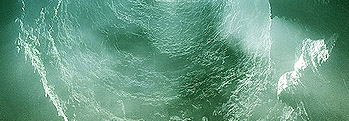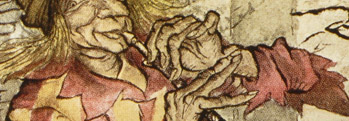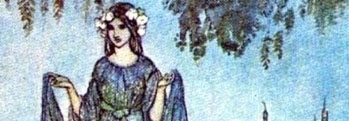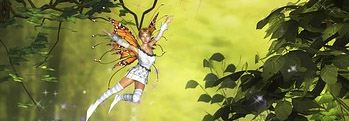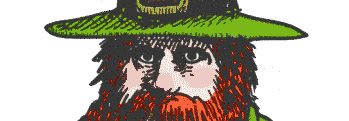The Cows of Connor
Irish and Celtic myths and legends, Irish folklore and Irish fairy tales tales of Ireland
An old enemy can sometimes become the best of friends
 Once in Ireland, somewhere around the south and east of the country near the old kingdom of Osraí, there lived a young farmer by the name of Connor. He had a small herd but a good one, of strong stock and unblemished, but one morning he arose from his bed before the dawn, as was his custom, and noticed that two of them were missing!
Once in Ireland, somewhere around the south and east of the country near the old kingdom of Osraí, there lived a young farmer by the name of Connor. He had a small herd but a good one, of strong stock and unblemished, but one morning he arose from his bed before the dawn, as was his custom, and noticed that two of them were missing!
This was no small or laughing matter, so he took in his hand a long blackthorn stick of the sort that was used for both walking and fighting, and went forth to search for his missing cows. All day he travelled, through many parishes, towns and villages, asking everyone had they seen his cattle, but none had.
The sun had set and the evening was beginning to come in, and Connor felt despair, for he was tired and hungry, and he found himself under leaden grey darkening skies upon a desolate heath, with nothing for company but brambles and a low rough shieling, like the lair of a bandit or some wild beast.
Even so, when he spotted a gleam of light through the doorboards he went over and knocked, for even a rough bed was better than no bed!
A tall grey haired old man answered, and gazed upon Connor with dark, sharp eyes. He bid Connor welcome and introduced him to his wife, as tall and thin as her husband, but with oddly sharp teeth and fierce gleaming black eyes.
"Be welcome," she said "we have been waiting for you!" and she pulled out a chair at the table which was laden with food.
More than a little taken aback at this strange pronouncement and even stranger people, Connor nonetheless girded himself up and took a firmer grip on his blackthorn. He could fight his way clear if they set upon him, he reasoned, and in any case it was dark outside and he was very tired and hungry.
After he sat, a knock came at the door and the old man rose up and opened it letting in a slender young black wolf, who padded across the floor to another room! From that door came forth a dark, slender, handsome youth, who took his place at the table and looked hard at Connor with his glittering eyes.
"You are welcome," he said, "we have waited for you!"
Before Connor could answer another knock was heard and in came a second wolf, who passed on to the inner room like the first, and soon another darkly handsome youth came out and sat down to supper with them, glaring at Connor with his keen eyes, saying nothing.
"These are our sons," said the old man, "tell them what you want, and what brought you here amongst us, for we live alone and don't care to have nosey neighbours and strangers coming to our place."
So Connor told them his tale, about his missing cattle, and how far and wide he had searched for them. He admitted he didn't know who he was or who his hosts were, but if they happened to know where his cows were he'd thank them kindly and be on his way.
Then they all laughed and looked at each other, and the old hag looked more frightful than ever when she showed her long, sharp teeth.
I can tell you that Connor was an Irish man of the sort that brooked no insult, and he felt his hot temper start to rise, so he rose along with it, hefting his blackthorn and telling them to let him out. They paid him no heed but only mocked him until the eldest of the sons stood up.
"We are fierce and evil, but we never forget a kindness. Do you remember one day down in the glen you found a poor little wolf in great agony and likely to die because a sharp thorn had pierced his side? And you gently extracted the thorn and gave him a drink, and went your way leaving him in peace and rest?"
"Aye, well do I remember it," said Connor, "and how the poor little beast licked my hand in gratitude!"
"Well," said the young man, "I am that wolf, and I shall help you if I can, but stay with us tonight and have no fear."
Little less alarmed but perhaps mollified somewhat, Connor sat again and they feasted late into the night, until Connor fell asleep in his cups. He awoke the next morning, dew-covered in a large hay rick in his own field, and he thought to himself that the whole thing had been a dream. Still oddly confident, he went back to his house and looked around expectantly hoping to find the two missing cattle, but they were nowhere to be seen.
He felt as sad as he had ever felt, but then spotted at the gate three of the most beautiful cows he had ever set eyes on. They must have strayed in, he imagined, from some neighbour's land, and he took his big stick to drive them out of the gate off the field.
But when he reached the gate, there stood a young black wolf watching, and when the cows tried to pass out at the gate he bit at them, and drove them back. Then Connor knew that his friend the wolf had kept his word. So he let the cows go quietly back to the field, and there they remained, and grew to be the finest in the whole country, and their descendants are flourishing to this day.
As for Connor, he grew rich and prospered; for a kind deed is never lost, but brings good luck to the doer for evermore, as the old proverb says:
Blessings are won,
By a good deed done.
But never again did Connor find that desolate heath or that lonely shieling, though he sought far and wide to return his thanks as was due to the friendly wolves. Neither did he ever again meet any of the family, though he mourned much whenever a slaughtered wolf was brought into the town for the reward, fearing his fine friends might be the victim.
For it was at that time the wolves in Ireland had grown so much in numbers, owing to the desolation of the country by constant wars, that a reward was offered and a high price paid for every wolf's pelt brought into the court of the justiciary.
And this was in the time of Queen Elizabeth, when the English troops made unending war against the Irish people. There were more wolves in Ireland than people, and the dead lay unburied in hundreds on the highways, for there were no hands left to dig their graves.
The old kingdom of Osraí can be found on the map below!
Further Folk and Faerie Tales of Ireland
The gift of the gab, as it’s known, is a common thing among the Irish – being able to talk all day about anything and everything, and do it in a way that would have you listen as well. It’s as Irish as red hair and freckles. But what if you didn’t have the gift of the gab, or felt a deficiency of gabbiness? Never fear, al ... [more]
Once upon a time in County Kerry, there lived a wealthy farmer and his wife, blessed in every way with the exception of only one – they had no children. They put a brave face on it, but with every year passing they grew older and their hopes grew colder, although the ember never quite faded. So you can imagine their delight when finally, a ... [more]
Michael O’Guggin from Cahir Cam was the only son of a small farmer in County Cork, and his family loved him well, so to keep him from getting on the boat to America with all of his friends, they signed over the farm to him and married him to a lovely girl at what we would consider a very young age these days, And yet although he had grown ... [more]
Long ago in the Eyeries in County Cork, there lived a wise woman by the name of Máire Ní Mhurchú, which was Mary Murphy in English. Now when I say a wise woman, I don’t mean she was a woman wise in old sayings and folksy ways – although she had no shortage of those either – I mean she was a bean feasa, one of ... [more]
There was never much call for police back in the old days in Ireland – everyone knew everyone else in the area and everyone knew what everyone else had done! While there were ups and downs to it, if someone was caught doing something particularly bad, they would be ashamed to meet anyone’s eye, and would eventually leave the area, head ... [more]
Our Irish ancestors from olden times were fascinated with the sky and its inhabitants, how they moved, what they meant and where their celestial lives intersected with our own. The Tuatha Dé Danann loved the sun foremost but others built places aligned to the movements of the moon and stars, many of which predate the solar structures. The ... [more]
From the earliest times in Ireland the tiny native wren has been regarded with respect as the wisest bird of all, who outsmarted the eagle to become the king of the birds of Ireland. Indeed some believe that its name in Irish, dreoilín, means trickster. The craftiness of this little bird was how it got its crown, for the king of all the b ... [more]
The Stonemen of Ireland were once a great tradition throughout the country, a tradition that reached back to the earliest antiquity of the nation. And yet if you ask what a Stoneman might be today, very few if any will be able to give you the answer! It might be found yet in the Aran Islands in the furthest west, but not many other places. Mille ... [more]
The tying of elaborate knots to bind a wish or curse is an ancient practise in Ireland. The followers of Manannan, lord of the waters, were reputed to tie reeds into eldritch shapes and cast them into bogs as an offering. Different knots had different spiritual meanings, as with the St Bridgit’s cross, rushes woven into a Christian icon. Our ... [more]
Long ago in Ireland, although not so long that a wide oak might not remember, there lived in county Roscommon a farmer by the name of Donal O’Leary. Now Donal was known far and wide as a crafty fellow, or cute as we say in Ireland, and a skilled hand with the cards to boot, but he made one mistake – he played cards with the two farmers ... [more]
The mightiest heroes and warriors of ancient Ireland understood well that the greater part of battles were fought in the hearts and minds of men and women. A tired and bloodied warrior may fight like a cornered wolf if his courage is up, while a well fed and rested champion may sag in dismay at the touch of fearful sorrow. This was a different m ... [more]
A king in Ireland asked his daughters whom they wanted to marry. The oldest wanted the king of Ulster, the second the king of Munster, and the youngest the Brown Bear of Norway. That night, the youngest princess woke to find herself in a grand hall, and a handsome prince on his knees before her, asking her to marry him. They were married at once ... [more]
The fairy tales and legends of Ireland are bound into her very soil and seed, and few more so than the humble ragwort, the Buachalán Buíde! This plant was known as the fairy horse, and little children were warned not to touch it for fear they would be spirited away by the fairies on their yellow horses. Stories were told up and ... [more]
Hares in Ireland have long been seen as mysterious creatures, deeply connected to the otherworld and the subject of legend, song and story. Their association with the realms of the fairies and good folk led the old Druids to capture and release them in a place with many openings, such as a stone circle, to see which way they would run. Then the Dru ... [more]
Once in Ireland, somewhere around the south and east of the country near the old kingdom of Osraí, there lived a young farmer by the name of Connor. He had a small herd but a good one, of strong stock and unblemished, but one morning he arose from his bed before the dawn, as was his custom, and noticed that two of them were missing! This ... [more]
Hazel trees, or the crann coill, are among the most important trees in Irish mythology and folklore. They are associated with wisdom and authority, and in old English the word "haesl" means "rod of power". The druids would often choose to carry a hazel wand over an oaken staff, and so respected as chieftain trees were they that ... [more]
It took the fancy of one of the gentry, who lived near to the Earl of Orrery’s seat, to play cards with his friends one day, so he sent his butler to purchase a new deck of cards. However as the man passed an old mound he paused in surprise, for what was waiting for him but a table loaded with good cheer and a fine company making merry! Cu ... [more]
You will know the cursed place by these three tokens – an elder tree, a lonesome calling corncrake, and thickets of nettles. Should a traveller see, smell and hear these signs they would know to turn around quick and hurry back the way they had come, before something unpleasant took an interest in them! The Irish made cursing into an art f ... [more]
There is a kind of cross, not unlike the much more famous St Brigid's cross, which can only be made on Hallowe'en or Samhain as it used to be known. It could be hung inside the front door, in the thatch or elsewhere within the house, and it was reputed to offer protection from bad luck, sickness, curses and the fairy folk who might be up to ... [more]
The ancient Irish festival of Samhain, or as we know it today, Hallowe'en, is rooted deep in the very bedrock of Ireland, among the customs of those who first arrived here when the great ice withdrew. On this advent of the darkest time of the year they imagined their worst fears coming true, the dead walking and evil spirits hovering outside th ... [more]
The majestic Irish wolfhound, known as the Cú Faoil in Irish, famed in history and mythology, is one of the largest and strongest dog breeds in the world. It is certainly is one of the tallest, reaching over seven feet in height when standing on its hind legs! As it was known in ancient times, the great Irish hound was held in such high r ... [more]
Of all the many plants trees, shrubs and green growing things in Ireland, there are few as closely woven into Irish mythology as the holly, or Cuileann. It was seen by the old people as one of the noble trees, and it was never cut down completely, although sprigs were often taken for the decoration and protection of homes. Some would ask permission ... [more]
Lughnasa means “the gathering of Lugh” the many-gifted, who was once a leader of the Tuatha Dé Danann. In times we know only from myth and legend, this festival was celebrated for the two weeks leading up to the cross-quarter date, which might have been anywhere from the first to the fourteenth of August, and for two weeks afterw ... [more]
The month of July was known for the past several centuries in Ireland as the hungry month, since that was when the food from last year's harvest began to run out or had spoiled. The ability of the typical Irish household to store food and save money to buy more was at its lowest by the middle of the nineteenth century, even before the great hun ... [more]
Although it is less celebrated these days, the midsummer festival used to be an important occasion in Ireland, going back many centuries, far into ancient times. Even as lately as fifty years ago half the streets in Ireland would have their own bonfire, or more properly bone fire, since the Irish word for “bonfire” is tine cnaimh. The b ... [more]
The crane is one of the largest birds you might encounter, and once it was common throughout Ireland. Sadly cranes left these shores more than three centuries ago, so a nesting pair being spotted recently is cause for celebration! They were making their new home on a rewetted raised peat bog, one of many being returned to the wilderness in Irela ... [more]
Back in the olden days when fairies were more often seen than they are today, whether that was because there were more people in the countryside or there was more countryside, farmer Purcell rented a few acres in Mourne near Mallow in Cork, as his means allowed. Those means didn't allow much, sad to say, for his plot was poor and barren. Lik ... [more]
When the spring turns to summertime in Ireland, a carpet of golden yellow rolls out under drumlin skies across the wild places to greet the changing seasons, the exuberant growth of the gorse, which some call whinn, broom or furze, although in the old language it's known as Aiteann, which means “sharp”. And well named it is, for the ... [more]
May is a magical month in more ways than one! The beginning of May marked one of the cross quarters of the year, when the world grew thin in certain places, as the old folks used to say, and the Sidhe and other spirits could travel over and back between our world and theirs. The exact date wanders from year to year mind you, sometimes earlier, some ... [more]
The author of the Long Black Hand was a man called Richard Cronnolly, born in Ballinderreen County Galway in 1828. He spent his spare time in the record office where he studied old documents. Although he was not a wealthy man and had no help from anyone, he found a publisher just before he died at the very young age of thirty five. The Long Blac ... [more]
Not all that long ago there lived a decent family on the border of Tipperary, Michael Flannagan and Judy his wife were the two that were in it. Although they were not blessed with wealth, they were blessed with children, four sons to be exact. Three of these lads were as fine and stout a trio as you'd ever hope to see, and it was enough to m ... [more]
One of the many ancient Irish traditions whose origin has been lost to the ever-deepening mists of time is that of the wishing tree. They were also called rag trees, raggedy bushes, or clooty or cloughtie trees, and they can often be found growing next to or near holy wells and springs. When people gathered around the old turf fires in Ireland, ... [more]
The Sceach Geal is a tree that grows in Ireland and throughout the north of the world and its name means “bright thorn” or moon thorn. It was known in Brehon law as an Aithig fedo or a Commoner of the Wood, a quickthorn like its ferocious cousin the blackthorn, and it is also called hawthorn, the gentle bush, the lone thorn, the May tre ... [more]
Throughout Ireland can be found many holy wells and blessed springs, most of which predate the arrival of Christianity on the island, but which were consecrated by the Church to the service of Christ. Within some of these wells and deepnesses, the old legends tell, swim sacred guardians and fish of strange repute! To this day the people of Irela ... [more]
Lough Gur is a place of great antiquity and the source of many strange rumours and legends, surrounded by misty forests and low rolling hills, not all of which are natural in origin! Once there was an island in the middle of the lake, but now it is a peninsula, and it is joined to the eastern shore by a causeway, not far from the village of Aney ... [more]
There was a farmer in County Kerry who had a nice little cottage for himself and his wife, but the thatched roof was in a terrible state of disrepair and unlikely to last another winter. Unlike the stone houses and cottages in the west, Kerry cottages were less sturdy, and so he knew he had to build himself another place to live. He searched thr ... [more]
Long ago in Ireland, at the dawn of the Christian age, Irish monasteries and schools were famed throughout Europe and the world for the depth of their knowledge and the quality of the education they gave to princes, lords and nobles who travelled from all parts to attend them. One of the most famous early Christian theologians who taught in thes ... [more]
The people of Ireland before the time of Saint Patrick had many strange customs, and some of these survive even to this very day, often mixed and combined with Christian rites and beliefs! One of those traditions was the sunwise walk. What this meant was, in order for good luck to attend an event, you had to walk around it sunwise or deiseal, pr ... [more]
We have a saying in Ireland, that it's the only place in the world where you can get all four seasons in the one day – well there's truth in that, but Irish weather can be even stranger than most people realise! So it is with the Gaoth Sidhe, which means “the fairy wind,” and is pronounced “gwee sheeha”. Oft ... [more]
One upon a time in Ireland, in the farthest west of County Clare, there lived a brave young chieftain whose name was O'Quinn. A kindly enough man was he, and fair to behold, of ruddy locks and clean limbs, and he made his Dún on a flat plain near to a clearwater spring, the purest in all of Ireland and perhaps all the world. He was co ... [more]
Cursing of various sorts has a history as long and rich as Ireland's own, stretching from the very earliest tales of the first settlers in Ireland all the way to the modern day. Whether a quick muttered malediction on someone who had crossed you or an elaborate, lengthy poem intended to satirise and ruin the legacy of a king, the mallacht, or c ... [more]
Much has been said but little written of the old Irish piseóg, the word of the curse. Now the same term is often used to refer to general traditions and superstitions in Ireland, things like if you're ever lost, turn your socks inside out to find your way home, or opening the back door if you hear a knock at the front door, to let the fa ... [more]
Dotted around Ireland in many places can be found bullán stones, meaning “bowls”, which are stones, large and small, with a depression or bowl in them, often filled with water. These are usually of great antiquity, stretching back before the time of St Patrick and before the time of Cú Chulainn and Fionn Mac Cumhaill, and ... [more]
There's a common misconception some might have about fairies, which is the idea that fairies are nice friendly little spirits, trailing pixie dust and turning pumpkins into luxury vehicles. As any of the old folk of Ireland could tell you, nothing could be further from the truth, for a fairy in wrath is more dangerous than a hive of wasps or a ... [more]
Sometimes when out and about travelling the lesser known byways of Ireland, you might come across a little stone arrowhead or piece of flint shaped by hands long gone, and people would tell you not to touch it for fear it might carry the tinneas sióg, the sickness of the fairy mounds! For it was that fairies, the sidhe, were known to hurl ... [more]
The sinister crone of the woods, the wishing thorn, there are as many tales told of the blackthorn trees of Ireland as there are spiky thorns on its branches. The people who came before, whose blood still runs in some, planted them around their tombs and sacred places and bound the lunantisidhe, or moon fairies to protect them, save only on the ful ... [more]
Once upon a time there was a poor woman with three daughters, and one day the eldest decided to seek her fortunes in the world. “Mother,” she said, “bake me a cake and kill my chicken, for I am away to the wide world.” And so her mother did just that, and when all was ready, her mother asked “which will you have ... [more]
A fair witch crept to a young man's side, And he kissed her and took her for his bride. But a shape came in at the dead of night, And filled the room with snowy light. And he saw how in his arms there lay A thing more frightful than words may say. And he rose in haste, and followed the Shape Till morning crowned an eastern cape. ... [more]
Once upon a time, not so long ago, a lovely young couple had just gotten married in the Irish countryside. It was a wonderful ceremony and all had remarked on how beautiful the bride looked, when suddenly their festivities and dancing were interrupted by the groom, who rushed into the crowd shouting that his Margaret was missing! Well they ... [more]
They do say that once upon a time, long ago, there lived a lady of great beauty in a castle on a lake, and her hair was fair as gold, shining in the summer sun. She had been promised to a king's son, the lord of a nearby kingdom, but as he was coming to see her one dark November evening, who should come upon him but the warriors of a jealous lo ... [more]
One evening in late November, which is the time of year when the spirits of Ireland have the most power, the prettiest girl in all the land was going to the ancient well for water. Then, as chance would have it, her foot turned on a loose stone, and she fell. It was bad luck, but when she got back to her feet, it seemed as though she was in a stran ... [more]
Baile the son of Buan was renowned through Ulster and all of Ireland for his tale-telling, and loved for his his kindly nature, but most of all by by Aillinn, daughter of Lughaidh. From afar they shared sweet messages and poetry, and as time passed she grew to love him more and more, and he in kind. Everyone spoke well of them and looked forward to ... [more]
In the olden days there was a man who played the pipes, but he was not famous for it, or if he was it was for the wrong reasons, since he had but the one tune, a jaunty jig called The Black Rogue. Now it happened one dark night that he was on his way home after entertaining the gentlemen, and with a few pence in his pocket and a few drinks under hi ... [more]
Times were hard in Ireland back years ago, and while some might say they've had it tough today, it was not a patch on the hardships people endured in times gone by. And so it was with Michael McGovern, a poor farmer with hardly an acre of stony soil to rent, who looked upon his three young sons with love for the life of them and fear for their ... [more]
There was a prince in Ireland a long, long time ago, back when Ireland still had princes, and O'Donall was his name. A brave fellow he was, and powerful, but given to risk and heedless thrills in his hunting and leaping and running and swimming, all the better to impress his friends. He was lord of a wide land, and he wasn't hard on the poo ... [more]
A woman was out one day looking after her sheep in the valley, and coming by a little stream she sat down to rest, when suddenly she seemed to hear the sound of low music, and turning round, beheld at some distance a crowd of people dancing and making merry. And she grew afraid and turned her head away not to see them. Then close by her stood a you ... [more]
They say that in Ireland you will enjoy all four seasons in a day, but on this day the four seasons were high and glorious summer, or so it seemed to Tom Fitzpatrick as he walked along a narrow road between two tall hedges in harvest time. As he walked, he chanced to hear a strange ringing like a tiny bell, and he paused, puzzled as to what it migh ... [more]
Connla of the Fiery Hair was one of the sons of Conn of the Hundred Battles, and his favourite son, a swift and agile warrior with a voice that could make the mountains tremble. Himself and his father climbed the heights of Usna on Samhain, when he saw coming towards them a slender maiden of great beauty, clad in strange clothes. “Where do ... [more]
Strange are the ways of the Fairies of Ireland, and strange the look about them, but for all their wild and untamed manner they follow rules written in the ripples of willow-branches on still ponds, and laws murmured by the echo of birdsong in deep wells. Once there was a woman sitting in her cottage, a humble enough abode, and she was making wo ... [more]
There are many types of fairy in Ireland, some more risky than others, and some to be avoided due to their habits rather than out of any particular malevolence. Such a one is the Gan Ceanach, whose name means “Without Love”. Although you might think such a title would indicate a friendless creature of a lonely nature lacking in socia ... [more]
There are a great many raths or fairy forts of old scattered throughout Ireland today, numbering in the tens of thousands, and it is here, the wise say, that the good people or fairy folk gather to hold their revels. Nobody would dare to cross, let alone build on a fairy dwelling in the past, marking as they did the boundary between our civilise ... [more]
Near to the town of Fermoy in Ireland lies the great stack of Cairn Thierna, not as wide about nor as tall as some mountains perhaps but feared and respected by the local people nonetheless. For all around it and along its flanks are tall heaps of stones they say are the work of the fairy folk, or the old people who lived here long ago. And you ... [more]
On the road going down to Cork there's an old set of four walls that used to once be called Ronayne's Court. Although there's little enough to see of it nowadays still the stack of the chimneys stands proud, and on it can be seen the coat of arms of the family that built it and used to live there. They were a fine couple and had one ... [more]
It was known in times past in Ireland that there were men and women who could talk to the fairies, ask favours from them, and even live among them, and some used this acquaintance to work their will on the world, for good or for ill. Most famous, perhaps, among these people were the fairy healers of old. Biddy Early is the best known of their ki ... [more]
James Mac Neill was as strapping a young fellow as you could hope to meet, and likely with it. Never did he walk away from a tussle or a drink, and never far from his hand was his shillelagh. He had no fears save the lacking of a pint, no cares except for who would pay for it, and not a thought in his head but how to have fun after it. One cold ... [more]
Maurice Mulreaney was well known for travelling about the countryside without fear of anything living or otherwise, as quick to cross a graveyard or fairy mound as you or I would be to cross the street, for he didn't believe in that which he couldn't see with his own two eyes or touch with his own two hands, and he didn't bother with ol ... [more]
It wasn't a bad life for Fergus O'Hara in Owenmore, for all that himself and his wife Rose had little, the little they had was enough for them. Some goats, pigs and poultry ranged far and wide about their few acres, and a field of oats and potatoes kept them busy for the harvest and brought in a few pennies. It so happened that there lay ... [more]
The children of De Danann once ruled the island of Ireland, before they departed back to their own lands in the farthest west or went below the earth in their fairy mounds to dance and sing forevermore, but if you're lucky – or unlucky! – you might still come across them in the wild places and those deep forests yet untouched. An ... [more]
Some of the Sidhe in times of old would take a fondness for one particular family, protecting it and helping it rise in the world, and so it was with the O'Briens, who were known as the Dál gCais, or the Dalcassians. Their fairy guardian was called Aoibhell, whose name means burning ardour or beauty, depending on who you ask. She had ... [more]
Irish legends from time immemorial have a great deal to say about the land of the fairies, the home of the Tuatha De Danann, or the world of the Sidhe. There are those who claim it lies beneath fairy mounds or on the other side of deep caves where Druids once held tryst and shared magical secrets, while other tales tell of heroes and adventurers, e ... [more]
It's well known among those who know of such things that fairies love to dance more than anything else, and they take it ill should anything interfere with their merriment. And if someone wanted to spoil a dance, they could come up with few better ways of doing so than to send a herd of cattle wandering through! The hill atop Knockshegowna w ... [more]
The cheerful Leprechaun is about as well known an emblem of Ireland as you could want, but what truth lies behind the stories? Well the truth is nobody really knows the truth, for leprechauns are are a cagey bunch at the best of times, not prone to gossip or holding forth on the important events of the day or the local hurling results, even after a ... [more]
After the Tuatha De Dannan were defeated in battle by the great race of Milesians, who held sway in Ireland long after, some of the Tuatha decided to leave and go elsewhere while some chose to stay in Ireland. Those that stayed agreed that they must live beneath the earth, and they were led by a great King in the west, Finnbhear son of Dagda, who i ... [more]
Some might wonder, who or what are the fairy folk? There are stories upon stories of them and their doings in many places, but most of all in Ireland, where it was said they lived longest and if they still walk the earth, where they can yet be found! The country folk claim they are fallen angels lacking the merit to stay in heaven while being kindl ... [more]




